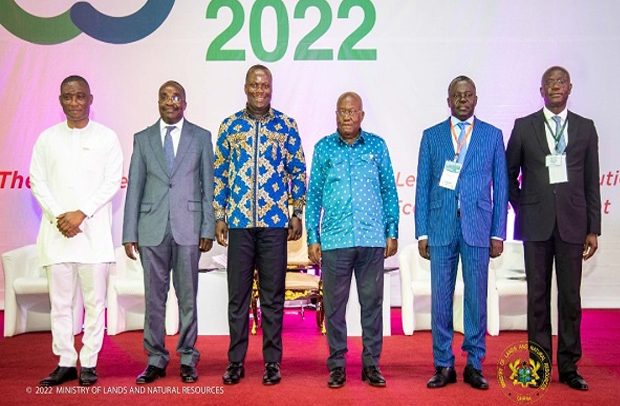President Akufo-Addo, Samuel Abu Jinapor and other dignitaries at the conference
PRESIDENT AKUFO-Addo has called on the Lands Commission to expedite action on processes leading to the digitisation of the country’s land administration.
Addressing the 2022 National Land Conference in Accra yesterday under the theme: “Leveraging National Land Policy, Legislation and Institutional Capacity towards Sustainable Socio-Economic Development,” he said “in this age of technology, it is unacceptable that we are still operating in a largely manual environment.”
“We cannot deliver an efficient land administration if documents on land have to be processed manually. We must therefore expedite action on the digitalisation agenda, and ensure that the Commission goes fully digital.
“Nana Chair, land remains the number one factor of development. We must all therefore work together to build an effective and efficient land administration to propel our development,” he emphasised.
According to him, successive governments have sought, through numerous initiatives, to improve Ghana’s land administration regime, the most significant intervention being the Land Administration Project (LAP), Phases 1 and 2, which sought to lay the foundation and consolidate urban and rural land administration and management systems for efficient and transparent land service delivery.
“These interventions have yielded some results, such as the reform of the Lands Commission through the enactment of the Lands Commission Act, 2008 (Act 767), the establishment of five (5) Client Service Access Units (CSAUs) at the Lands Commission to enhance service delivery, the establishment of Customary Land Secretariats, reforms in the judiciary through the establishment of specialised land courts and the automation of some courts, the enactment of the Land Use and Spatial Planning Act, 2016 (Act 925), the introduction of a new three-tier Spatial Planning Model, and the development of a National Spatial Development Framework and two (2) Regional Spatial Development Frameworks,” he disclosed.
However, he said in spite of these interventions, Ghana’s land administration was fraught with several challenges. “There is, therefore, the need to do an objective analysis of the current land tenure system, assess the continued efficacy of the customary system of land ownership and its dynamism and adaptability, to meet the growing demands from various users of land.”
“I recall, that when I inaugurated the members of the Lands Commission on September 1, 2021, the Chairman of the Commission, the hardworking Alex Quaynor, Esq., promised that the Commission under his leadership was going to pursue reforms. Today, I am happy that the Commission is putting its words into action, through this important conference on leveraging land policy and legislation for socio-economic development,” he pointed out.
“The dynamics of land tenure and land rights, the relationship between population growth and land rights evolution, and the competition between different land uses such as mining, agriculture and infrastructure, demand that we take bold decisive actions to ensure that our land resources are well managed for optimum returns.
“It is for this reason that during the first term of my presidency, we prioritised the passage of Land Bill, which had been in the draft stage for over twenty (20) years. The Land Act, 2020 (Act 1036), which I assented to on December 23, 2020, revises, harmonises, and consolidates laws on land to ensure sustainable land administration and management, as well as effective and efficient land tenure system.
“Over the years, customary system of land tenure, including the “abunu” and “abusa” systems, had been the pivot around which our farming practices revolved. Unfortunately, in our urban areas, customary land system has been the bane of most of our problems, including double sale of land, wrongful sale of lands by people without capacity, multiple claims to land by different stools, skins, clans or family, among others. We must therefore take a critical look at land administration and develop a model that works for us.
“Fortunately, the Land Act, 2020 (Act 1036), provides a strong foundation for fashioning out a workable and efficient land administration. The Act has far-reaching provisions that if implemented, will go a long way to build the effective land administration we desire,” President Akufo-Addo noted.
The Minister for Lands and Natural Resources, Samuel Abu Jinapor, in a speech, said his ministry recognised the urgent need to ensure that land administration was fully digitised to make the system efficient and corruption-free.
He added that steps have been taken and were still being taken to ensure that all aspects of land administration in Ghana got digitised.
“We are working rigorously to ensure the digitisation and digitalisation of the records of the Lands Commission,” he said.
Mr. Jinapor indicated that “this will lead to improved maps and spacial data, digital transformation, systematic recording, verification and creation of national cadastral and implementation of national spacial data infrastructure,” whilst urging all stakeholders to double their efforts at making this possible soon.


